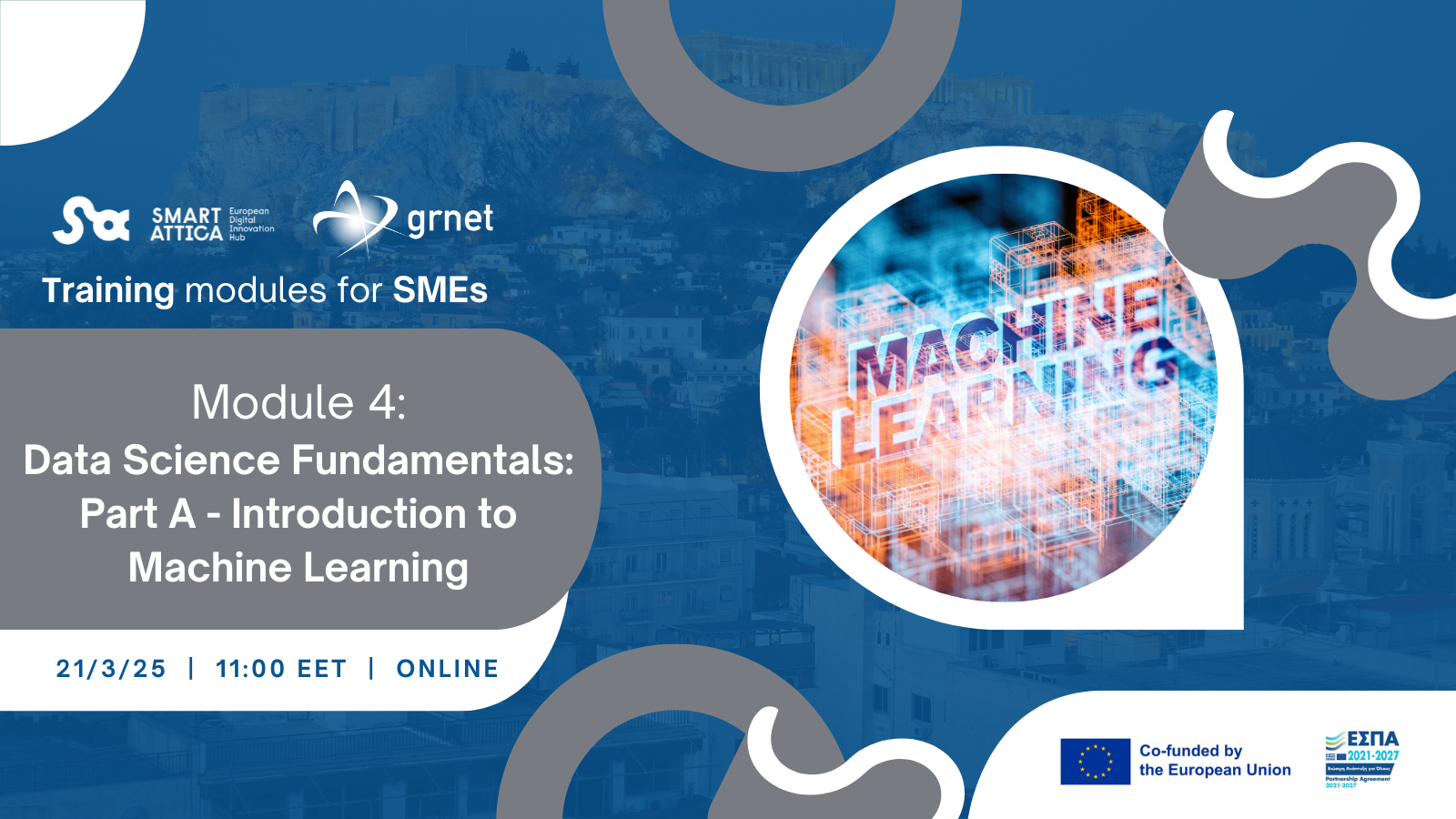

GRNET announced, in the context of SmartAttica EDIH (European Digital Innovation Hub), the 4th Module of Τraining modules for SMEs with the subject "Data Science Fundamentals: Part A - Introduction to Machine Learning", that took place online on March 21st, 2025.
Date: March 21st, 2025, at 11:00 EET
Location: Online via Zoom
Presentation Language: Greek
Instructor: Dr. Nikolaos Bakas (GRNET)
Description: This module offered a foundational introduction to machine learning and data mining, key components of data science that involve extracting patterns and making predictions from data. Participants explored various machine learning models, understand the fundamentals of training and optimizing these models, and gain insights into applying data mining techniques to structured datasets. The module aimed to provide a comprehensive overview of how these approaches can be utilized to drive business insights and solutions.
Target Audience:
This module is designed for data analysts, software developers, business professionals, and newcomers to data science who are keen to understand the basics of machine learning and data mining. It is suitable for individuals who want to harness the power of these tools to enhance decision-making and derive value from data.
Learning Objectives:
By the end of this module, participants will be able to:
-
Understand the core concepts and processes in machine learning and data mining.
-
Differentiate between traditional programming and machine learning approaches.
-
Recognize various types of machine learning models and their applications.
-
Implement basic data mining techniques to explore and analyze structured datasets.
-
Understand the role of optimization in training machine learning models.
-
Analyze and visualize data to uncover patterns and trends.
Prerequisites:
Participants should have:
-
A basic understanding of Python programming is advantageous.
-
Curiosity and interest in machine learning and data science applications.
Note: Please enter your institutional/corporate email when registering.
Indicative Contents
-
Introduction to Machine Learning
-
Overview of machine learning and its significance in the modern data-centric world.
-
Comparison between traditional programming and machine learning paradigms.
-
-
Core Machine Learning Concepts
-
Key components: input-output relationships, model training, and prediction.
-
Types of machine learning: supervised, unsupervised, and reinforcement learning.
-
-
Essential Machine Learning Models
-
Linear and logistic regression, decision trees, and ensemble methods (e.g., Random Forest, XGBoost).
-
Introduction to neural networks including ANNs, CNNs, and RNNs.
-
-
Data Mining Techniques
-
Definition and importance of data mining in extracting insights from big data.
-
Initial steps in data mining: data collection, cleaning, and transformation.
-
Exploratory data analysis and visualization methods.
-
-
Model Training and Optimization
-
Fundamentals of training machine learning models.
-
Overview of optimization techniques: gradient descent and Newton’s method.
-
Discussion of model accuracy, overfitting, and evaluation metrics.
-
-
Hands-On Activity
-
Practical exercises using Python to implement a simple machine learning model.
-
Application of data mining techniques on a sample dataset.
-
-
Future Trends and Applications
-
Discussion on the evolving landscape of machine learning and data mining.
-
Emerging techniques such as Generative AI and their real-world applications.
-
-
Summary and Q&A
-
Recap of key takeaways from the session.
-
Open floor for questions, discussions, and insights sharing.
-
The project is co-funded by the European Union. Views and opinions expressed are however those of the author(s) only and do not necessarily reflect those of the European Union or the European Commission. Neither the European Union nor the granting authority can be held responsible for them.
